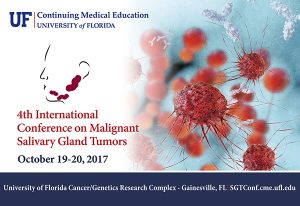Conference Description
Salivary gland malignancies remain a subject of misclassification and broad categorization especially in the analysis of retrospective clinical data and in prospective clinical trial design. This is largely due to their rarity and lack of objective clinico-pathologic criteria. Recently, specific translocation breakpoints have been mapped with the discovery of new fusion oncogenes that underlie the etiology of these tumors and define the most common subtypes. Therefore, in response to the new emerging genetic and biological data the International Conference on Malignant Salivary Gland Tumors was implemented to bring together investigators from different disciplines, different departments, and from different countries to catalyze new collaborations and therapeutic strategies, to spur the interest and mentorship of new young investigators, and to highlight the clinical implications of these new research accomplishments.
The 4th International Conference on Malignant Salivary Gland Tumors will take place on October 19-20, 2017 at the University of Florida Cancer/Genetics Research Complex. The conference will focus on the primary goal of bringing together clinicians and basic scientists to foster new ideas, experiments, and clinical trial opportunities for patients with salivary gland cancers. There are new genetically engineered mouse models largely unpublished for both adenoid cystic cancer and for mucoepidermoid cancer and this is an important time to bring together all participants to maximize collaborations and accelerate progress. There are new opportunities for studying salivary gland development and stem cells for understanding tumorigenesis and resistance to cancer treatments. This conference has a history and track record for inclusion of young investigators and fostering mentorship, collaborations, and sharing of reagents and patient related resources that is highly regarded among participants.
Target Audience
This program is intended for basic science investigators in the broad fields of cancer biology, molecular genetics, small molecule discovery, immunobiology, and animal tumor model systems as well as all surgical and medical clinicians and ancillary staff who manage patients with malignant salivary gland tumors and are focused on development of new therapeutic strategies.
Learning Objectives
At the conclusion of this activity, participants should be able to:
1. Define and describe the important histologic and biologic features of different subtypes of malignant salivary gland tumors.
2. Understand the range of current clinical treatments and gain knowledge to develop new clinical strategies to treat patients with advanced malignant salivary gland tumors.
3. Define and describe the key cancer gene pathways that underlie major histologic subtypes of malignant salivary gland tumors, including adenoid cystic cancer and mucoepidermoid cancer.
CME Accreditation & Credit Information
- Accreditation: This activity has been planned and implemented in accordance with the accreditation requirements and policies of the Accreditation Council for Continuing Medical Education through the joint providership of the University of Florida College of Medicine, MD Anderson Cancer Center, and the University of New Mexico Comprehensive Cancer Center The University of Florida College of Medicine is accredited by the ACCME to provide continuing medical education for physicians.
- Credit: The University of Florida College of Medicine designates this live activity for a maximum of 11.5 AMA PRA Category 1 Credits™. Physicians should claim only the credit commensurate with the extent of their participation in the activity.


